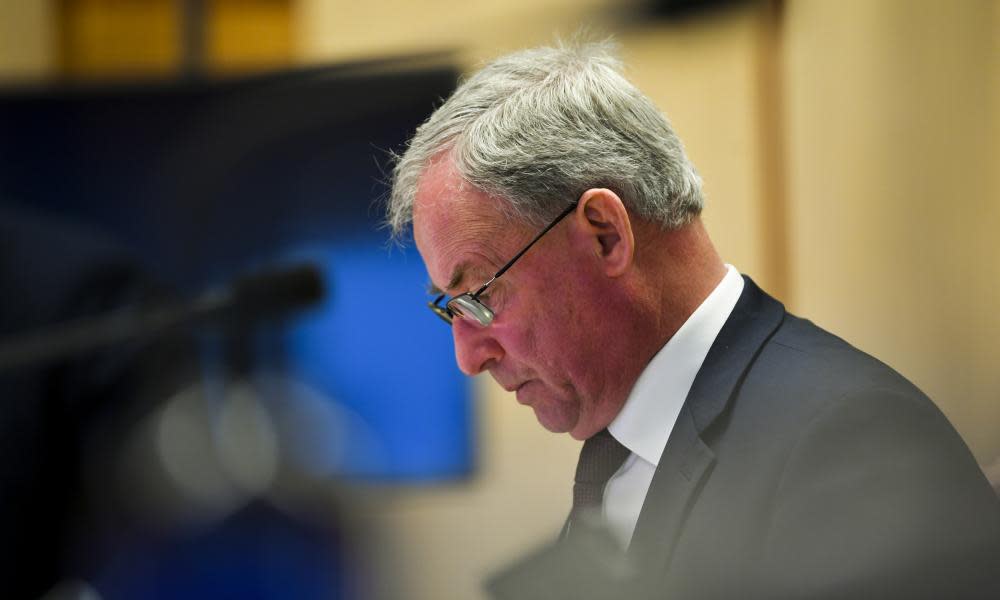Coalition ignored warnings it needed vaccination tracking system for aged care staff

The federal government was warned in March 2020 it needed a system to track Covid vaccinations in the aged care workforce but multiple approaches from an established provider were ignored.
Australian company OnePassport, whose digital immunisation system is used by 10,000 workers in the Victorian hospital system, approached the federal government and the country’s two largest aged care providers about the need to better monitor the aged care workforce on multiple occasions over the past 15 months.
In correspondence to the aged care minister, Richard Colbeck, in March last year, the chief executive, Michael Maher, said OnePassport had been asked by providers to develop a Covid register to help “with trying to limit cross-infection by workers and manage general workforce risk better during this current crisis”.
At that time, the company was focused on a system for monitoring symptoms and testing, as well as tracking responses to questions about Covid risk.
Related: Three people assigned to Australia’s aged care Covid response team during early stages of pandemic
But in a proposal titled “Covid-19 Register for Aged Care, Disability and Healthcare sectors” sent to Colbeck at the time, the problem of attempting to track the vaccination status of the workforce throughout the pandemic was also canvassed.
“Once a Covid-19 vaccination has been created, it will be important to track who has received the vaccination or not,” the briefing stated.
In April this year, the company’s chief medical officer, Peter Sloan, who is also the director of medical services at four regional hospitals in Victoria, sent an email to the federal health minister, Greg Hunt, and the health department secretary, Prof Brendan Murphy, flagging the need to better track the workforce.
In the ministerial briefing note, OnePassport said that “health and aged care services need to store, track and monitor staff immunisation and negative Covid test status”. It offered to discuss how its system could be used to collect the required information.
In June, after Colbeck admitted in Senate estimates that the government had no idea how many aged care workers had been vaccinated, Maher followed up with the minister’s office, saying the immunisation pass would be able to “help the aged care sector rapidly and inexpensively deploy a common immunisation passport”.
“That would assist providers in the rollout of both Covid and flu vaccinations, as the majority are currently using spreadsheets, as well as provide automated and real-time updating to the department on staffing numbers and vaccination rates,” he said.
Several private aged care providers in NSW are now using the system.
Related: More than 75% of Australians support compulsory Covid vaccines for aged care staff
The Coalition has come under sustained pressure for its failings in the aged care sector during the pandemic, with the vaccine strategy beset by delays and confusion despite the workforce being included in the 1a priority group.
Guardian Australia has reported that the branch responsible for the federal government’s aged care Covid response was left with just three staff members in the pandemic’s early stages.
In response to questions from Guardian Australia to both Hunt and Colbeck’s office, the health department said the Office of Health Protection and Response had communicated with OnePassport about its proposal.
“The Australian government is not developing a vaccination passport for aged care,” a spokesperson said.
“The government has announced that aged care providers will report on staff vaccination numbers through the new reporting tool on the My Aged Care provider portal which is now operational.”
The system, which is mandatory from Tuesday, will record de-identified data on the total number of aged care workers at each aged care service.
“The data will assist governments and aged care providers in understanding the current status of workforce vaccination, support public health measures on Covid-19 and inform any adjustments needed to support workers’ access to a Covid-19 vaccination,” the department said.
Vaccination figures released on Monday show there have been 5.87m doses administered across the country.
All 2,566 registered aged care facilities have received a first dose while 2,414 of these have received a second dose – the equivalent of 94.1%.
Hunt said that the government was expecting to release updated figures on the number of aged care workers to receive their vaccinations on Tuesday once aged care home operators submitted the data.

 Yahoo Movies
Yahoo Movies 
